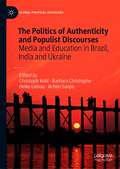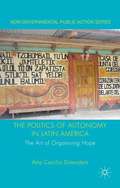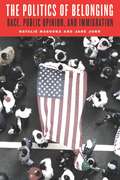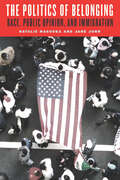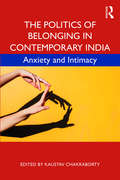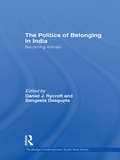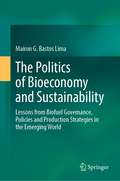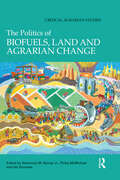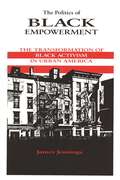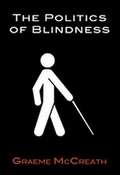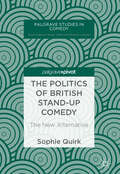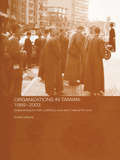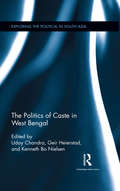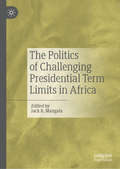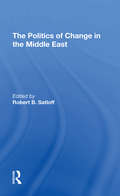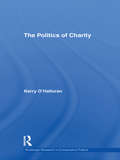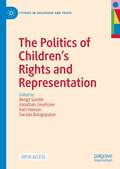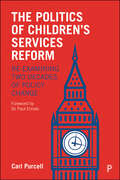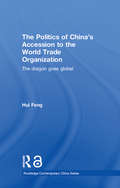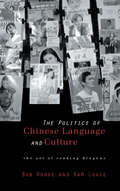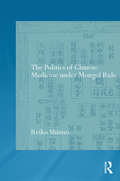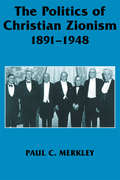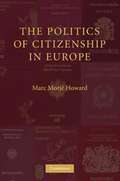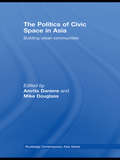- Table View
- List View
The Politics of Authenticity and Populist Discourses: Media and Education in Brazil, India and Ukraine (Global Political Sociology)
by Christoph Kohl Barbara Christophe Heike Liebau Achim SaupeThis edited volume breaks new ground and opens up new perspectives by capturing the role played by claims to authenticity in populist discourses in Brazil, India and Ukraine. By conceiving of both triumphant populism and increasing demands for authenticity as expressions of crisis, the volume seeks to satisfy the need to take a closer look at yearnings for orientation in a globalised world that is often associated with rapid social change and the disappearance of old certainties. Starting from the assumption that media play a crucial role for populist discourses of authenticity, the volume moves beyond conventional and social media by expanding its focus to media in formal education, notably school textbooks and curricula. These two particular media formats lastingly shape younger generations and thus the future. The proposed volume adopts global perspectives from three postcolonial countries that are often beyond the scope of studies dealing with populist discourses and media entanglements – insights that contribute new aspects to international scholarly debates.
The Politics of Autonomy in Latin America
by Ana Cecilia DinersteinThe author contests older concepts of autonomy as either revolutionary or ineffective vis-à-vis the state. Looking at four prominent Latin American movements, she defines autonomy as 'the art of organising hope': a tool for indigenous and non-indigenous movements to prefigure alternative realities at a time when utopia can be no longer objected.
The Politics of Being a Woman
by Heather Savigny Helen WarnerWhat does it mean to be a woman in the 21st century? The feminist movement has a long and rich history, but is its time now passed? This edited collection is driven by the question, why is feminism viewed by some (we would add a majority) as outdated, no longer necessary and having achieved its goals, and what role have the media played in this?
The Politics of Belonging: Race, Public Opinion, and Immigration
by Natalie Masuoka Jane JunnThe United States is once again experiencing a major influx of immigrants. Questions about who should be admitted and what benefits should be afforded to new members of the polity are among the most divisive and controversial contemporary political issues. Using an impressive array of evidence from national surveys, The Politics of Belonging illuminates patterns of public opinion on immigration and explains why Americans hold the attitudes they do. Rather than simply characterizing Americans as either nativist or nonnativist, this book argues that controversies over immigration policy are best understood as questions over political membership and belonging to the nation. The relationship between citizenship, race, and immigration drive the politics of belonging in the United States and represents a dynamism central to understanding patterns of contemporary public opinion on immigration policy. Beginning with a historical analysis, this book documents why this is the case by tracing the development of immigration and naturalization law, institutional practices, and the formation of the American racial hierarchy. Then, through a comparative analysis of public opinion among white, black, Latino, and Asian Americans, it identifies and tests the critical moderating role of racial categorization and group identity on variation in public opinion on immigration.
The Politics of Belonging: Race, Public Opinion, and Immigration (Chicago Studies in American Politics)
by Natalie Masuoka Jane JunnThe United States is once again experiencing a major influx of immigrants. Questions about who should be admitted and what benefits should be afforded to new members of the polity are among the most divisive and controversial contemporary political issues.Using an impressive array of evidence from national surveys, The Politics of Belonging illuminates patterns of public opinion on immigration and explains why Americans hold the attitudes they do. Rather than simply characterizing Americans as either nativist or nonnativist, this book argues that controversies over immigration policy are best understood as questions over political membership and belonging to the nation. The relationship between citizenship, race, and immigration drive the politics of belonging in the United States and represents a dynamism central to understanding patterns of contemporary public opinion on immigration policy. Beginning with a historical analysis, this book documents why this is the case by tracing the development of immigration and naturalization law, institutional practices, and the formation of the American racial hierarchy. Then, through a comparative analysis of public opinion among white, black, Latino, and Asian Americans, it identifies and tests the critical moderating role of racial categorization and group identity on variation in public opinion on immigration.
The Politics of Belonging in Contemporary India: Anxiety and Intimacy
by Kaustav ChakrabortyThis volume looks at the emerging forms of intimacies in contemporary India. Drawing on rigorous academic research and pop culture phenomena, the volume: Brings together themes of nationhood, motherhood, disability, masculinity, ethnicity, kinship, and sexuality, and attempts to understand them within a more complex web of issues related to space, social justice, marginality, and communication; Focuses on the struggles for intimacy by the disabled, queer, Dalit, and other subalterns, as well as people with non-human intimacies, to propose an alternative theory of the politics of belonging; Explores the role of social and new media in understanding and negotiating intimacies and anxieties. Comprehensive and thought-provoking, this book will be useful to scholars and researchers of political studies, sociology, sexuality and gender studies, women’s studies, cultural studies, and minority studies.
The Politics of Belonging in India: Becoming Adivasi (Routledge Contemporary South Asia Series)
by Daniel J. Rycroft Sangeeta DasguptaSince the 1990s, the Indigenous movement worldwide has become increasingly relevant to research in India, re-shaping the terms of engagement with Adivasi (Indigenous/tribal) peoples and their pasts. This book responds to the growing need for an inter-disciplinary re-assessment of Tribal studies in postcolonial India and defines a new agenda for Adivasi studies. It considers the existing conceptual and historical parameters of Tribal studies, as a means of addressing new approaches to histories of de-colonization and patterns of identity-formation that have become visible since national independence. Contributors address a number of important concerns, including the meaning of Indigenous studies in the context of globalised academic and political imaginaries, and the possibilities and pitfalls of constructions of indigeneity as both a foundational and a relational concept. A series of short editorial essays provide theoretical clarity to issues of representation, resistance, agency, recognition and marginality. The book is an essential read for students and scholars of Indian Sociology, Anthropology, History, Cultural Studies and Indigenous studies.
The Politics of Bioeconomy and Sustainability: Lessons from Biofuel Governance, Policies and Production Strategies in the Emerging World
by Mairon G. Bastos LimaThis book addresses the underexposed political dimensions of bioeconomy promotion. Who wins and who loses? How are institutions being shaped, and by whom? Drawing from experiences since the earlier days of biofuels promotion, it explores in unprecedented detail the global drive away from fossil fuels and towards a biomass-based economy.Multipurpose agriculture gains ever more traction as countries create new bio-based value chains – or, rather, value webs. Governance, in this regard, proves to be key for steering developments towards inclusive agri-food-biomass systems instead of fueling just a handful of “flex crops” ridden with social equity and other environmental issues.Based on a rich global-level analysis of bioeconomy promotion and three in-depth case studies of key emerging economies (Brazil, India and Indonesia), the book also innovatively examines sustainability politics in Global South democracies.Ultimately, this book is about finding the politics for a fairer bioeconomy in the years and decades to come.
The Politics of Biofuels, Land and Agrarian Change (Critical Agrarian Studies)
by Saturnino M. Borras Philip McMichael Ian ScoonesThis book addresses key questions on biofuels within agrarian political economy, political sociology and political ecology. Contributions are based on fresh empirical materials from different parts of the world. The book starts with four key questions in agrarian political economy: Who owns what? Who does what? Who gets what? And what do they do with the surplus wealth? It also addresses the emergent social and political relations in the biofuel complex and, given the impacts on natural resources and sustainability, engages with questions about people-environment interactions. At the same time, the book is concerned with the politics of representation, that is, what are the discursive frames through which biofuels are promoted and/or opposed?The book analyses the institutional structures, and cultures of energy consumption on which a biofuels complex depends, and the alternative political and ecological visions emerging that call the biofuels complex into question. Across sixteen chapters presenting material from five regions across the North-South divide and focusing on fourteen countries including Brazil, Indonesia, India, USA and Germany, these topics are addressed within the following themes: global (re)configurations; agro-ecological visions; conflicts, resistances and diverse outcomes; state, capital and society relations; mobilising opposition, creating alternatives; and change and continuity.This book was published as a special issue of the Journal of Peasant Studies.
The Politics of Black Empowerment: The Transformation of Black Activism in Urban America
by James JenningsIn analyzing Black politics since the late 1960s, James Jennings focuses on both the behavioral aspects, such as individual and group characteristics of voting and nonvoting and elections, as well a more fundamental philosophical and cultural questions regarding Black politics. This study examines how the "traditional" face of Black politics and electoral activism interacts with a growing "progressive" face of Black politics. While traditional Black political activists seek access or political incorporation, another group aims for power sharing. The traditional approach is sometimes satisfied with merely replacing white politicians with Blacks, but the progressive constituency focuses on fundamentally changing the whole economic and political pie. Activist desirous of Black empowerment are pursuing a political and economic orientation that goes beyond programs based on access to American institutional arrangements and attempting to change or alter given political arrangements and social relations between Blacks and whites on the basis of changing the social structure and the distribution of wealth and power. Based on interviews with Black and Latino activist in several big cities as well as review of the literature and the Black newspapers around the country, The Politics of Black Empowerment describes the characteristics of Black empowerment activism in America.
The Politics of Blindness: From Charity to Parity
by Graeme Mccreath<P>This book provides a rallying cry so that the voice of users of services can be heard, and both the provision of services can be tailored by and shaped to their needs. <P>The anti-discrimination clause, which I was proud to contribute to in the extension of the Disability Discrimination Act, the creation of the Disability Rights Commission (now part of the Equality and Human Flights Commission) and the Office of Disability inside UK government, has enabled individual and collective experience of inequality and discrimination to be tackled head on.
The Politics of British Stand-up Comedy: The New Alternative (Palgrave Studies in Comedy)
by Sophie QuirkThis Palgrave Pivot questions how a new generation of alternative stand-up comedians and the political world continue to shape and influence each other. The Alternative Comedy Movement of the late 1970s and 1980s can be described as a time of unruly experimentation and left-wing radicalism. This book examines how alternative comedians continue to celebrate these characteristics in the twenty-first century, while also moving into a distinct phase of artistic development as the political context of the 1970s and 1980s loses its immediacy. Sophie Quirk draws on original interviews with comedians including Tom Allen, Josie Long, John-Luke Roberts and Tony Law to chart how alternative comedians are shaped by, and in turn respond to, contemporary political challenges from neoliberalism to Brexit, class controversy to commercialism. She argues that many of our assumptions about comedy’s politics must be challenged and updated. This book is essential reading for anyone who wants to understand the working methods and values of today’s alternative comedians.
The Politics of Buddhist Organizations in Taiwan, 1989-2003: Safeguard the Faith, Build a Pure Land, Help the Poor
by André LalibertéLaliberté looks at a relatively unexplored aspect of modern Taiwan: the influence of religion on politics. This book offers a detailed survey of three of the most important Buddhist organizations in Taiwan: the Buddhist Association of the Republic of China (BAROC), the Buddha Light Mountain (or Foguanshan) monastic order, and the Buddhist Compassion Relief Tzu Chi Association (or Ciji). It examines their contrasting approaches to three issues: state supervision of religion, the first presidential election of 1996, and the establishment of the National Health Insurance.This study analyzes the factors that explain the diverse paths the three organizations have taken in the politics of Taiwan. Based on an in-depth examination of Buddhist leaders' behaviour, The Politics of Buddhist Organizations in Taiwan compels us to question conventional views about the allegedly passive aspect of religious tradition, deference to authority in societies influenced by Confucian culture and the adverse legacy of authoritarian regimes.
The Politics of Caste in West Bengal (Exploring the Political in South Asia)
by Kenneth Bo Nielsen Uday Chandra Geir HeierstadThis volume offers for the first time a comprehensive and in-depth analysis of the making and maintenance of a modern caste society in colonial and postcolonial West Bengal in India. Drawing on cutting-edge multidisciplinary scholarship, it explains why caste continues to be neglected in the politics of and scholarship on West Bengal, and how caste relations have permeated the politics of the region until today. The essays presented here dispel the myth that caste does not matter in Bengali society and politics, and make possible meaningful comparisons and contrasts with other regions in South Asia. The work will interest scholars and researchers in sociology, social anthropology, politics, modern Indian history and cultural studies.
The Politics of Challenging Presidential Term Limits in Africa
by Jack R. MangalaThis book takes stock of the debate surrounding the institution of presidential term limits in Africa, against the backdrop of global trends toward authoritarianism and the rise of strong men. Widely adopted three decades ago, term limits for the office of the president are now being challenged by many African leaders. The power alternation debate in Africa raises important questions concerning the future of democracy and development on the continent. Using a case study approach, this book explores in detail six situations in which leaders have either succeeded or failed in altering term limits. It thoroughly dissects the arguments, tactics and strategies on both sides of the issue, and draws key lessons for strengthening constitutionalism in Africa.
The Politics Of Change In The Middle East
by Robert B SatloffThis book examines regime stability and political change in the heartland of the Middle East. It discusses the distribution of power within each regime of the Middle East; the sources of regime legitimacy; and the social, economic, and ideological trends influencing change in the region.
The Politics of Charity (Routledge Research in Comparative Politics)
by Kerry O'HalloranFor the first time since 1601, a number of leading common law nations have almost simultaneously chosen to revise and place on the statute books the law relating to charity. The Politics of Charity examines the reasons for this and for the varying legislative outcomes. This book examines the legal framework and political significance of charity, as developed within England & Wales, contrasts this with the experiences of other common law nations and explores the resulting implications for government/sector relationships in those countries. It suggests that charity law lies at the heart of the relationship between government and the non profit sector, that there is an unmistakeable political agenda driving charity law reform and that the differential in legislative outcomes reflects important differences in the policies pursued by the governments concerned. Looking at fundamentally different approaches of government towards the sector in the UK, Ireland, the US, New Zealand, Canada, Singapore and Australia, O’Halloran argues the results will have implications for the present workings of parliamentary democracy. The Politics of Charity will be a valuable resource for academics, regulators and legal practitioners as well as advanced and postgraduate students in law, politics and public policy.
The Politics of Children’s Rights and Representation (Studies in Childhood and Youth)
by Bengt Sandin Jonathan Josefsson Karl Hanson Sarada BalagopalanThis open access edited volume investigates children and youth's deep entanglement in today's major global, national, and local transformations and processes: wherein they are not mere spectators and objects of transformations but instead actively shape them through various social, economic, and political representations. International contributions illuminate the problems that arise when children's rights and participation become a site of contestation and power over who represents whom, what, when, and where. The authors do not provide simple solutions, instead offering an understanding of the fundamental nature of these problems as founded in the application of rights and the nature of representation in modern society. Together, the authors emphasize that child representation must take into account the local and spatial context of how representations of children are discussed, as well as possible discrepancies between local, regional, national, and global processes.
The Politics of Children's Services Reform: Re-examining Two Decades of Policy Change
by Carl PurcellDrawing on unique access to prominent policy makers including ministers, senior civil servants, local authority directors, and the leaders of children’s sector NGOs, Purcell re-examines two decades of children’s services reform under both Labour and Conservative-led governments. He closely examines the origins of Labour’s Every Child Matters programme, the Munro review and more recent Conservative reforms affecting child and family social workers to reassess the impact of high profile child abuse cases, including Victoria Climbié and Baby P, and reveal the party political drivers of successive reform.
The Politics of China's Accession to the World Trade Organization: The Dragon Goes Global (Routledge Contemporary China Series #Vol. 8)
by Hui FengGrounded on a series of first-hand interviews with Chinese government officials, this book examines China’s accession to the World Trade Organization, providing an ‘inside’ look at Chinese WTO accession negotiations. Presenting a systematic political economy model in analyzing Beijing’s decision-making mechanisms, the book argues that China’s WTO policy making is a state-led, leadership driven, and top-down process. Feng explores how China’s determined political elite partly bypassed and partly restructured a largely reluctant and resistant bureaucracy, under constant pressure from an increasingly globalized international system. By addressing China’s accession to the WTO from a political analysis perspective, the book provides a theoretically informed and intriguing examination of China’s foreign economic policy making regime. The book highlights contemporary debates relating to state and institutionalist theory and provides new and useful insights into a significant development of this century.
Politics of Chinese Language and Culture: The Art of Reading Dragons (Culture and Communication in Asia)
by Kam Louie Bob HodgeAn innovative text which adopts the tools of cultural studies to provide a fresh approach to the study of Chinese language, culture and society. The book tackles areas such as grammar, language, gender, popular culture, film and the Chinese diaspora and employs the concepts of social semiotics to extend the ideas of language and reading. Covering a range of cultural texts, it will help to break down the boundaries around the ideas and identities of East and West and provide a more relevant analysis of the Chinese and China.
The Politics of Chinese Medicine Under Mongol Rule (Needham Research Institute Series)
by Reiko ShinnoUnder the rule of the descendants of Chinggis Khan (1167-1227), China saw the development of a new culture in which medical practice came to be considered a highly respected occupation for elite men. During this period, further major steps were also taken towards the codification of medical knowledge and promotion of physicians’ social status. This book traces the history of the politics, institutions, and culture of medicine of China under Mongol rule, through the eyes of a successful South Chinese official Yuan Jue (1266-1327). As the first comprehensive monograph on history of medicine in China under the Mongols, it argues that this period was a separate moment in Chinese history, when a configuration of power different from that of previous and succeeding periods created its own medical culture. The Politics of Chinese Medicine under Mongol Rule emphasizes the impact of the political and institutional changes caused by the Mongols and their collaborators on the social and cultural history of medicine, which culminated in the medical theory of Zhu Zhenheng (1282–1358), still influential in East Asian medicine. Using a variety of Chinese-language sources including gazetteers, legal texts, biographies, poems, and medical texts, it analyses the roles of the Mongols and West and Central Asians as cultural brokers and also as unifiers of China. Further, it views North and South Chinese elites as agents of historical change rather than as victims of Mongol oppression. Underlining the complexity of the history of China under the Mongols and the significance of time and geography for the study of this history, this book will be of great interest to students and scholars of Chinese medical history, Chinese social and cultural history, and medieval global history.
The Politics of Christian Zionism 1891-1948
by Paul C. MerkleyFor this book Professor Merkley has researched presidential archives, Jewish historical libraries and official Zionist records in the US and in Israel for evidence of the dealings between official Zionists and active Christian Restorationists. Much of this record appears here for the first time in print and is linked to the much better known history of the relationship between the official Zionists and the politicians and leaders of the US and Britain.
The Politics of Citizenship in Europe
by Marc Morjé HowardIn this book, Marc Morjé Howard addresses immigrant integration, one of the most critical challenges facing European countries today, the resolution of which will in large part depend on how foreigners can become citizens. Howard's research shows that despite remarkable convergence in their economic, judicial, and social policies, the countries of the European Union still maintain very different definitions of citizenship. Based on an innovative measure of national citizenship policies, the book accounts for both historical variation and contemporary change. Howard's historical explanation highlights the legacies of colonialism and early democratization, which unintentionally created relatively inclusive citizenship regimes. The contemporary analysis explores why some of the more restrictive countries have liberalized in recent decades, whereas others have not. Howard's argument focuses on the politics of citizenship, showing in particular how anti-immigrant public opinion - when activated politically, usually by far right movements or public referenda - can block the liberalizing tendencies of political elites. Overall, the book shows the far-reaching implications of this growing and volatile issue
The Politics of Civic Space in Asia: Building Urban Communities (Routledge Contemporary Asia Series)
by Amrita Daniere Mike DouglassThis book explores how and why civic spaces are used by different communities in Asia and what role urban governance and public participation play in the support or demise of communities. Using case studies of contemporary city life throughout, the contributors provide insights into the importance and value of civic space, arguing that civic spaces provide not only the physical sites for civil society to function autonomously; but also provide a sense of place in the form of identity, meaning, memory, history and linkages with the wider world. Each chapter focuses on the production of and access to civic spaces in a particular Asian city, as well as examples of successes and failures that can inform urban policy regarding inclusive, tolerant and socially vibrant city life through focused attention on the provision and continuity of civic space. This book is designed to provide information to policymakers, researchers and students of the developing world regarding the importance and value of civic space in terms of creating and supporting urban communities. As such, The Politics of Civic Space in Asia will be an invaluable resource for those interested in urban planning, urban design, public policy and political science, as well as Asian studies more generally.
